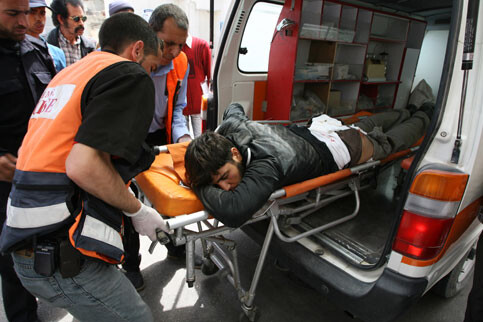The Electronic Intifada 11 April 2008

Palestinian paramedics carry a wounded man to Kamal Adwan hospital in Jabaliya refugee camp, northern Gaza Strip following an Israeli airstrike, 8 April 2008. (Wissam Nassar/MaanImages)
GAZA CITY, 12 April - “I am bleeding uncontrollably, I need an ambulance.” That was not a call to emergency services, it was an appeal broadcast live on radio in Gaza City.
Who knows whether there will ever be an ambulance or not. But this way the ambulance services still hear the appeal broadcast on al-Iman FM Radio Station, one of few independent radio stations in Gaza. And if the emergency services cannot help, someone else who hears the appeal might.
The ambulance dispatcher announces he cannot get the ambulance to the man. An Israeli bulldozer is blocking the road, and an Israeli tank on a hilltop has been firing at the ambulance, he says. Nobody can say if anyone else got to help the man. But at least his SOS could have been heard.
Appeals again went on air after the Friday attacks on Bureij refugee camp, where the death toll climbed to 16 by the weekend. The deaths included six children among nine people killed Friday. Again, ambulance crews confirmed they could not reach many of the injured. But the appeals were made on radio for all to hear.
A man called from east of Jabaliya refugee camp asking for an ambulance for his wife about to deliver. The radio host asked his location, and that of Israeli tanks. “I can’t look from the window to see,” he said. “They will shoot me if I do.”
A lady called to ask an ambulance to clear the remains of a body lying on the door. IPS confirmed later that it was the body of Abdelrazek Nofal, who was 19. He was blown to bits by an Israeli tank shell.
Someone else called from Bureij asking for ambulance, and for food and water. “My mother needs to be in [a] hospital urgently,” he called the radio station to say. Another difficult mission, with the Israeli troops patrolling the area.
The appeals are heard on the radio day after day. No one can say what follows the appeals in each case. But the live broadcasts on the radio can be a lifeline — or at the least, a line of hope. Where emergency services and aid agencies are not listening in, the radio then calls them.
“It brings tears to my eyes,” says radio host Khaled al-Sharqawi. “I can sometimes hear shooting, and women and children screaming, asking for ambulances, and the ambulances cannot reach them.”
Emergency services keep the radio on, if only to go in when it’s safe to bring out bodies. On one recent mission, said Ahmed Abu Sall, who works as a volunteer medical worker, “we were shot at by an Israeli tank. Two bullets hit the wheels.”
This mission succeeded, as several do. But it can be a long haul to call and wait. Often, cell phone batteries run out as people call again and again with the appeals for help.
The Palestinian Telecommunications Company has given the radio station a toll-free number. That makes calling easier, but the radio station has to be on guard also against mischief. Hosts do what they can to check sources and credibility before putting an appeal live on air.
Not every call is a medical crisis. “In such cases we call human rights organizations,” Sharqawi told IPS. “But they usually tell us they cannot help people on the ground.”
Most people working at the radio station are young volunteers. And al-Iman isn’t the only one; several other local radio stations have begun now to hear and to broadcast live appeals for help.
All rights reserved, IPS - Inter Press Service (2008). Total or partial publication, retransmission or sale forbidden.
Related Links



